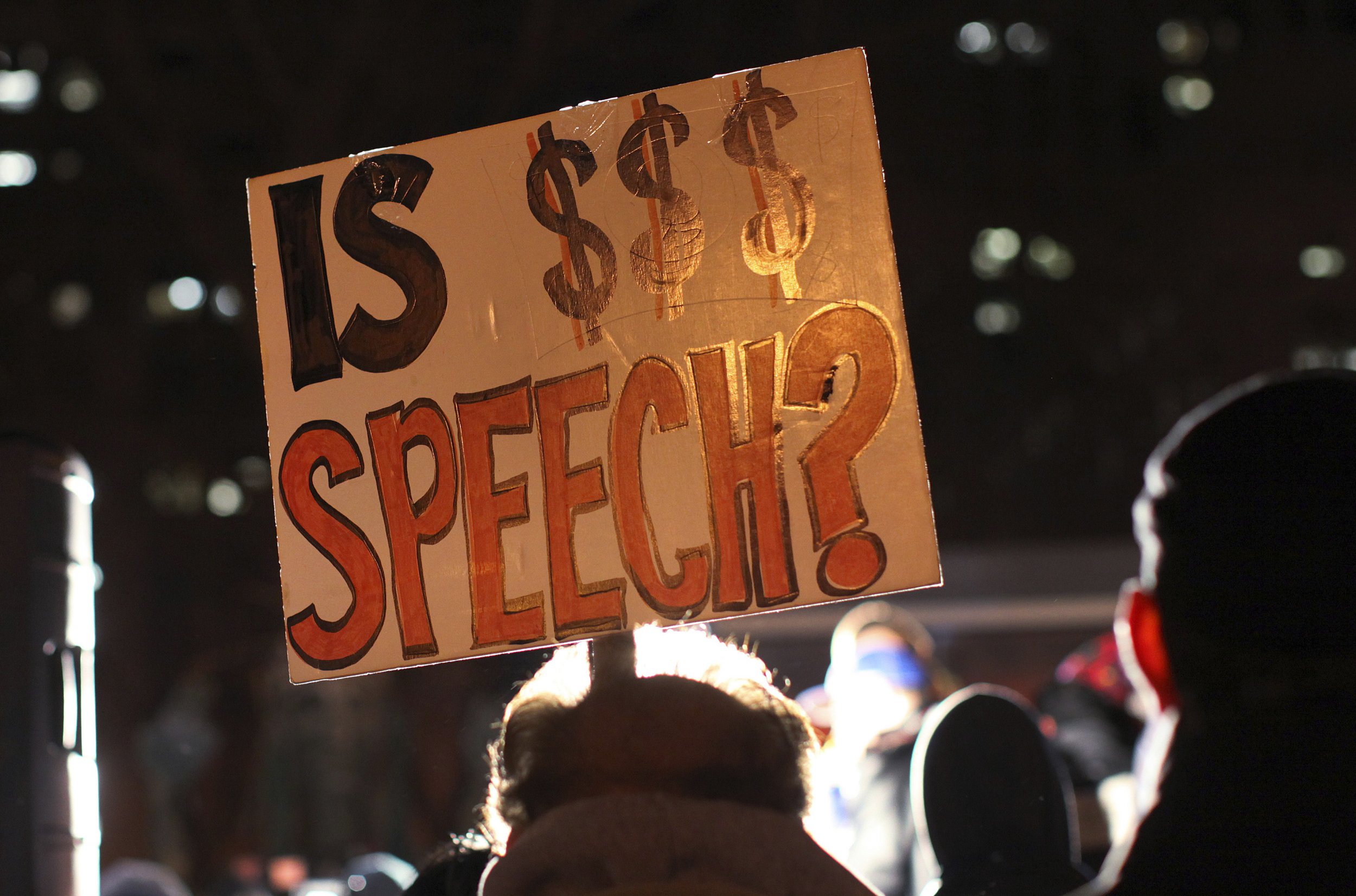
Corporations are taking over the First Amendment. That's not new, but it's accelerating—and we have the data to prove it.
Many people are familiar with the Supreme Court's 2010 Citizens United decision, which held that corporations have a First Amendment right to spend unlimited amounts of money to influence elections.
But the problem goes beyond election spending. Just one year after Citizens United, in a less widely reported decision, the court struck down a Vermont confidentiality law that prohibited sale of drug prescription data for marketing purposes. As the court explained, the law limited the "speech" of pharmacies and data miners that sell this data for use by pharmaceutical sales representatives.
Freedom of speech was long understood as a shield for controversial political and artistic statements. The first free speech case involving a business came in 1952, and it was in that spirit. It involved a somewhat cerebral short movie by Federico Fellini, "The Miracle," about a disturbed peasant girl who seems to have a sexual relationship with a man she believes to be Saint Joseph. After New York censored the movie as "sacrilegious," a movie distributor challenged the censorship law as violating the First Amendment, and the Supreme Court agreed.
But in 1976, the Court expanded the First Amendment's protection far beyond political and artistic expression. In the Virginia Pharmacy Board decision, the court invented the "commercial speech doctrine," giving courts power to strike down laws regulating the marketing and advertising of products with no artistic, political or expressive component, such as electricity and mushrooms. Businesses now routinely claim their "freedom of speech" is violated by mundane laws regarding consumer disclosure, privacy protection and even food ingredient labeling.
In the past two months, corporations have argued that they have a First Amendment right to block laws requiring labels to disclose added sugars in San Francisco, cellphone radiation risks in Berkeley, California and genetically engineered ingredients in Vermont. In September, a franchising trade group will argue that Seattle's minimum wage law violates (somehow) the First Amendment rights of multinationals like McDonald's. In one federal court, Arkansas is fighting to defend a ban on private surveillance firms using digital license plate scanners to record the movements of drivers on the state's roads. Another appellate court is weighing whether to revise its earlier ruling that a law requiring publicly traded corporations to report whether their products are made from conflict minerals violates these companies' freedom of speech.
This latest wave of corporate litigation is aimed directly at the Supreme Court. The businesses filing these cases bring in noted Supreme Court specialists, such as Paul Clements and Ted Olson. To be sure, many of these corporate claims never get far. But their proliferation is undeniable, many do win, and we can now put numbers on the trends.
From the 1950s to the 1970s, business claims occupied about 20 percent of the court's First Amendment docket. But since the Virginia Pharmacy decision, that proportion has doubled. And the court is siding with businesses more often. Before 1976, individuals won First Amendment cases twice as often as businesses did. Now they win at the same rate. In lower federal courts too, "commercial speech" cases have increased steadily.
Most of these corporate claims don't involve expressive businesses, such as newspapers, radio stations or book publishers. First Amendment claims by those types of businesses are often very similar to those involving people; the movie distributor's argument against censorship in the "Miracle" case is basically what Fellini himself might have argued.
But that's not true of most corporate First Amendment claims. When a tobacco company challenges a law banning outdoor cigarette advertising near schools, or when a "compounding pharmacy" challenges a law designed to prevent mixture and marketing of unapproved drugs, the claims are seeking nothing but profit, with speech as a fig leaf. Individuals don't bring these types of cases—they are a product of an insidious variant of business "strategy."
The shift is a problem not only for democracy but also for the economy. The genius of American business lies in innovating products, providing high-quality service, and fine-tuning manufacturing and supply processes to squeeze out inefficiencies.
But corporate managers can only focus on so many things at once. Companies increasingly place bets not on technological innovation but on legal and political "innovation"—what business schools teach under the Orwellian name "non-market strategies." As corporate success shifts toward extracting wealth via the political and judicial systems, career advancement will depend on learning the levers of power in courts, legislatures and regulatory agencies, and different skills and forms of "talent" will be rewarded. When lobbying and litigating pay off more reliably than innovating, the American century will finally be over.
That day may be near, but it has not yet arrived. Our economy and democracy were built with controls on corporate entities trying to move beyond the business of business and into government activity. As then-Justice William Rehnquist wrote in dissent to an early commercial speech case, "In a democracy, the economic is subordinate to the political, a lesson that our ancestors learned long ago, and that our descendants will undoubtedly have to relearn many years hence." It's time that we relearn that lesson.
John C. Coates IV is the John F. Cogan, Jr. Professor of Law and Economics at Harvard Law School. Ron Fein is the legal director for Free Speech for People.
Uncommon Knowledge
Newsweek is committed to challenging conventional wisdom and finding connections in the search for common ground.
Newsweek is committed to challenging conventional wisdom and finding connections in the search for common ground.





